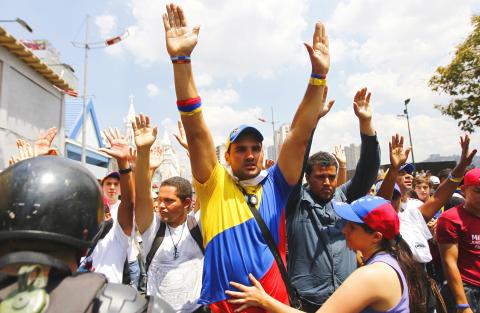Supporters of former Venezuelan president Hugo Chavez on Thursday hurled rocks and bottles in an attack on student protesters who were marching against perceived bias by Venezuela’s electoral council.
At least 10 students were reported injured in the violence that raised tensions in a country already sharply divided ahead of next month’s presidential election.
Hundreds of students had gathered at a central plaza in the morning and were making their way to the electoral council headquarters in downtown Caracas when they came upon a police barricade.

Photo: Reuters
About 100 Chavez supporters had gathered behind the barricade in the middle of broad Avenida Universidad and began throwing rocks and bottles at the approaching students. A few students lobbed the objects back, setting off a fierce volley between the two sides. At one point, several Chavez supporters pulled a student to the ground and repeatedly kicked him.
National police fired tear gas and scattered most of the students, but about 100 remained behind, left vulnerable to splinter groups of Chavez supporters who attacked from side streets. Police shooting plastic bullets ultimately repelled the attackers.
“The government supporters have ambushed us,” student leader Vilcar Fernandez said.
It was unclear how many people in total had been injured, and police did not release an estimate.
At one point, about 100 students were trapped by Chavistas who had blocked all the surrounding streets, preventing them from leaving. Many of the attackers wore T-shirts bearing the image of the late president and were chanting pro-Chavez slogans.
Police later escorted the students out of the area.
“It wasn’t our intention to confront or provoke violent acts, but the violence appeared because of minuscule groups that were sent to sabotage a legitimate protest,” student leader Gaby Arellano said.
She added that none of the students were seriously injured.
The election council sits in a neighborhood claimed by Chavez supporters, who have attacked anti-government demonstrations there in the past.
The protesters were demanding the electoral council eliminate requirements that voters have their fingerprints recorded before voting. The students also called on the council to stop Venezuelan acting president Nicolas Maduro from seizing TV and radio airwaves to promote his candidacy.
Demonstrators further demanded the resignation of Venezuelan Defense Minister Diego Molero, who has publicly supported Maduro. The constitution forbids the military from taking sides in politics, although soldiers are permitted to vote.
Opposition candidate Henrique Capriles has strongly criticized the electoral council for failing to stop perceived government bias for Maduro ahead of the April 14 vote.

A missing fingertip offers a clue to Mako Nishimura’s criminal past as one of Japan’s few female yakuza, but after clawing her way out of the underworld, she now spends her days helping other retired gangsters reintegrate into society. The multibillion-dollar yakuza organized crime network has long ruled over Japan’s drug rings, illicit gambling dens and sex trade. In the past few years, the empire has started to crumble as members have dwindled and laws targeting mafia are tightened. An intensifying police crackdown has shrunk yakuza forces nationwide, with their numbers dipping below 20,000 last year for the first time since records

EXTRADITION FEARS: The legislative changes come five years after a treaty was suspended in response to the territory’s crackdown on democracy advocates Exiled Hong Kong dissidents said they fear UK government plans to restart some extraditions with the territory could put them in greater danger, adding that Hong Kong authorities would use any pretext to pursue them. An amendment to UK extradition laws was passed on Tuesday. It came more than five years after the UK and several other countries suspended extradition treaties with Hong Kong in response to a government crackdown on the democracy movement and its imposition of a National Security Law. The British Home Office said that the suspension of the treaty made all extraditions with Hong Kong impossible “even if

CAUSE UNKNOWN: Weather and runway conditions were suitable for flight operations at the time of the accident, and no distress signal was sent, authorities said A cargo aircraft skidded off the runway into the sea at Hong Kong International Airport early yesterday, killing two ground crew in a patrol car, in one of the worst accidents in the airport’s 27-year history. The incident occurred at about 3:50am, when the plane is suspected to have lost control upon landing, veering off the runway and crashing through a fence, the Airport Authority Hong Kong said. The jet hit a security patrol car on the perimeter road outside the runway zone, which then fell into the water, it said in a statement. The four crew members on the plane, which

Japan’s ruling Liberal Democratic Party (LDP) and its junior partner yesterday signed a coalition deal, paving the way for Sanae Takaichi to become the nation’s first female prime minister. The 11th-hour agreement with the Japan Innovation Party (JIP) came just a day before the lower house was due to vote on Takaichi’s appointment as the fifth prime minister in as many years. If she wins, she will take office the same day. “I’m very much looking forward to working with you on efforts to make Japan’s economy stronger, and to reshape Japan as a country that can be responsible for future generations,”